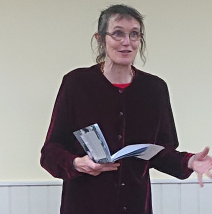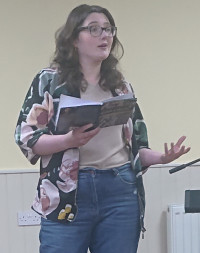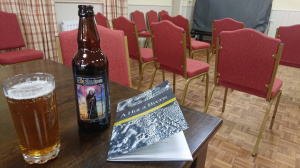Now hear the words of the bards: Bamburgh's Anglo-Saxon bones inspire poets

Northumberland’s rich heritage, and what is termed its ‘Golden Age’, were glimpsed at a remarkable poetry reading below the magnificent and imposing Bamburgh castle on the North Sea coast on Friday night. In the 19th century a storm revealed the remains of what turned out to be Anglo-Saxon people from 1,400 years ago – a cemetery uncovered in sand dunes close to the castle, in an area known locally as the Bowl Hole. These remains of over 120 skeletons have been recently re-interred in the crypt at nearby St Aidan’s church, pictured, after an 1999-2007 archeological project investigated who these people were, and where they came from, as far as could be established.
The Bamburgh Bones project evolved to help tell their story, and a number of poets were enlisted to create words inspired by the project. Foremost among them was Katrina Porteous, whose ‘A Hut a Byens’, which roughly means “a heap of bones”, is the title poem of the pamphlet containing poems by Porteous, with fellow poets Juana Adcock, Catherine Ayres, Jake Morris-Campbell, Kayo Chingonyi, Richard O’Brien, Jo Clement, Jenna Clake, and Jacob Polley.

Northumberland's 'Golden Age' refers to a period of cultural flowering in the Anglo-Saxon kingdom of Northumbria around the mid-seventh to the mid-eighth centuries, before the incursions of the Vikings. It was documented by the Venerable Bede, and produced such wonderful artefacts as the Lindisfarne Gospels.
Richard O’Brien’s ‘Questions of the Villagers’ concerned the introduction of Christianity to the region by St Oswald and Aidan, speaking in Old English and Old Irish: “Will death be different / once the two of you get back on your horses?” O’Brien is a lecturer in creative writing at Northumbria University.

Catherine Ayres lives and works in Alnwick, south-west of Bamburgh. She is currently researching Roman women who lived in the forts on Hadrian’s Wall at the time of Roman occupation. Her poem ‘The Irish Girl (Skeleton 73)’ tells of someone who is understood to have “spent your short life / at the loom”, with a front tooth that “held a needle’s groove”, details ascertained by the archeaologists.

Jacob Polley, who teaches at Newcastle University, said of his poem ‘Find’: “I thought about the bones as evidence, partly of unknowability. All the things we can’t find out … what made them, them.” There were also poems from Tony Williams, of Northumbria University, and John Challis, from Newcastle University. The two introduced the poets, and had commissioned and arranged the pamphlet poems. Another reader was Nathan Castle, a member of the school poetry club in Alnwick where Catherine Ayres teaches. There was musical entertainment in the interval, with Mark Deeks showcasing on keyboards a couple of numbers from his doomy metal album Take Up My Bones, about another Northumbrian saint, St Cuthbert.

Never mind a Golden Age, it was a golden evening. St Oswald's and St Aidan's ale flowed. But joking aside, there is a magic about places in Northumberland such as Bamburgh - a link to the past, that you can feel. The locals are proud of and rever their Anglo-Saxon bones. And so they should.







Greg Freeman
Tue 24th May 2022 08:07
Oops! Sorry, John ...